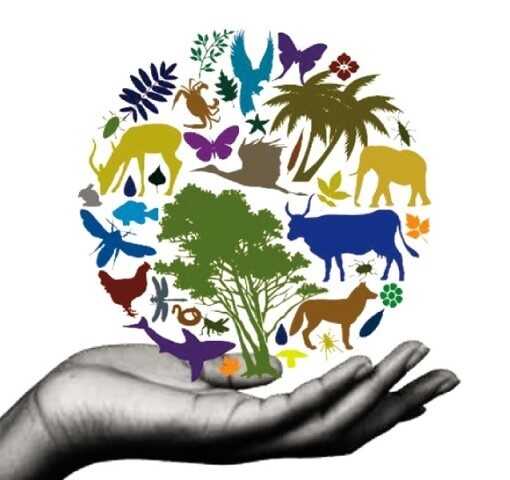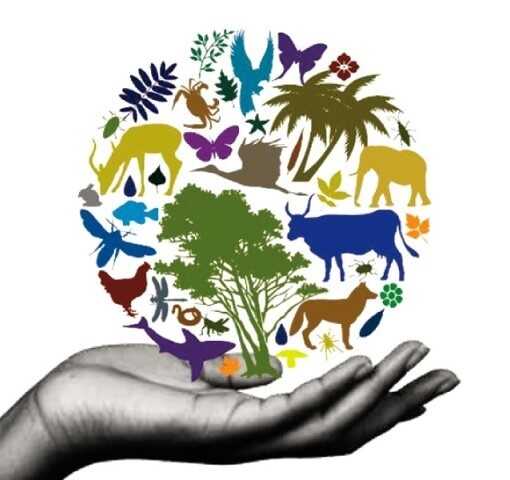
Udaipur : On the occasion of the International Day of Biological Diversity (22 May), Department of Environmental Sciences, M L Sukhadia University, Udaipur; Agrawal Girls’ PG College, Gangapur City and Rajasthan State Biodiversity Board, Jaipur along with their twelve partners from all over India and Globe organized an International Webinar. Through the partnering organizations, three university departments from Wildlife Sciences (University of Kota, Rajasthan), Environmental Studies (MS University Baroda, Gujarat) and Environmental Management (Vikram University, Madhya Pradesh) were instrumental in associating youngsters from their departments. The three educational institutes, namely, Sevadal Mahila Mahavidyalay (Maharashtra), Ramjas College (University of Delhi, New Delhi) and Institute of Health & Environment (Nepal) joined as HEIs.
As the NGO partners, KCES’ JalSRI (Jalgaon, Maharshtra), Rajputana Society of Natural History (Rajasthan) and Environment & Social Welfare Society (Khajuraho, MP) gave their eminent presence from different regions. The three global platforms, viz., Global Forum for Sustainable Rural Development, World Congress for Environment (Egypt) and Human Rights Education Association (Vadiodara, Gujarat) joined as key partners.
Overall 25 eminent environmental scientists and activists including the policy makers shared their views on the challenges and the possible solutions. Eight speakers from the five SAARC Nations, Middle East, Europe, Canada shared their approach towards the solutions.
In the opening session the Co-Patrons Prof. B. R. Bamniya, Chairman, Faculty of Earth Sciences, MLSU, Udaipur and Mr. O. P. Gupta, Chairman, Agrawal Shikshan Sanstha, Gangapur City gave the opening remark and welcomed all the guests. The Organizing Secretary Dr. Satya Prakash Mehra, Principal, Agrawal Girls College overviewed the Program Schedule. Dr. Swati Samvatsar, Director, JalSRI, Jalgaon and Er. Milind Pandit, Director, Rajputana Society of Natural History, Rajasthan convened the Webinar.
The Principal Secretary, Environment & Forest Department, Government of Rajasthan Mrs. Sreya Guha as the Special Guest stated the government role to cope up the environmental challenges especially related to the biodiversity conservation and well being of nature. The HOFF & PCCF Ms. Shruti Sharma shared her views on the solutions through their departmental approach whereas Chairman, RSBB Dr. Deep Narayan Pandey mentioned an importance of the biodiversity for the common mass. As a Guest of Honor Col. Prof. Vishnu Sharma, Hon. Vice Chancellor, Raj Univ. of Vet & AH gave the relevance of the indigenous species as key element of biodiversity. As the Guest Speakers, R. K. Meghwal, Dr. Satish Kumar Sharma from Rajasthan and Claire Finka from UK as Freelance Environment Activists delivered their views on giving solutions for the environmental challenges. The Member Secretary, RSBB Priya Ranjan delivered a Vote of Thanks.
The three Technical Sessions were arranged for the speakers to share their views. Dr. Swati Samvatsar (JalSRI, Maharashtra) and Dr. Pranab Pal (WII, Uttrakhand) for Technical Session One, Dr. Jayant Choudhary (GFSRD, ASSAM) and Dr. Zeeshan Khalid (MoCC, Pakistan) for Session Two, Prof. D. M. Kumawat (VU, MP) and Dr. Surabhi Srivastava (UoK, Rajasthan) Chaired and Co-Chaired for their respective sessions. Dr. Sanjay Choubey (AGC, Ganagpur City) collated the report whereas Dr. Harish Mangesh (MLSU, Udaipur) and Mr. Prakash Sharma (AGC, Gangapur City) technically regulated the online webinar. Dr. Anuya Verma (MLSU) delivered the vote of thanks to all the speakers and partners.
The Webinar was focused on sensitizing the young minds and the nature enthusiasts. Overall 2,248 participants registered for the webinar whereas viewership accounted over 10,000 through different channels. The speakers also presented the challenges and the possible solutions through their experienced works in different geographical terrains.
The outcome of the Webinar was ‘revival of the eco-cultural approach of the humans representing their compatibility with ecosystem’ need to be established. Through different case studies, the speakers shared their views on the possible solutions focused on the initiatives from the super species, i.e., humans.

